Nanosatellite CUSat to launch from California
By Blaine Friedlander
Launch update
This story has been updated to reflect launch delays. The Falcon 9 was previously set to launch Sept. 14, and is now tentatively scheduled to launch at the end of September.
After eight years of planning, submitting, winning, building and waiting, Cornell University’s CUSat – a nanosatellite designed and built by engineering students to help calibrate global positioning systems (GPS) with pinpoint accuracy – will be launched from Vandenberg Air Force Base, Lompoc, Calif.
The satellite – which weighs about 90 pounds – will be launched on a SpaceX Falcon 9 rocket. Once in space, the satellite will move into low orbit to help calibrate GPS accuracy to within 3 millimeters. With that precision, future space missions can perform improved close-proximity spacecraft-to-spacecraft maneuvers.
The satellite uses algorithms developed by Mark Psiaki, professor of mechanical and aerospace engineering, and Shan Mohiuddin, Ph.D. ’10.

“It’s a very exciting and busy time for the team. We’ve been performing weekly mission rehearsals for the past year and a half,” said Paul Jackson ’15, the Cornell team’s student project manager.
In 2007 the U.S. Air Force and the American Institute of Aeronautics and Astronautics chose CUSat – from among 11 entries – as the winner of its Nanosatellite Program’s Nanosat-4 competition. Since 2005, more than 200 engineering students have worked on the project.
The Cornell satellite is loaded and ready for launch on the SpaceX Falcon 9 rocket, whose primary payload is the Canadian Space Agency’s Cassiope digital broadcast satellite.
To communicate with the satellite in orbit, the team configured ground stations in Ithaca, the Marshall Islands, Colorado Springs, Colo., and Redondo Beach, Calif.
When the CUSat team won the Nanosat-4 competition in 2007, the project was slated for launch in June 2008 from the SpaceX launch complex in the Marshall Islands. But then the launch was postponed to late 2011/early 2012. Now, it will launch next week.
Alumni from the team’s early years tell Jackson they’ll watch the launch live from Vandenberg or with team members in Ithaca. “It's a very exciting time for our alumni. Many of them worked on CUSat for their senior design or master’s degree projects. They tell me it’s really great to see their work finally go into space and serve the intended purpose,” said Jackson.
When the team won the 2007 competition, its faculty adviser and principal investigator was Mason Peck, professor of mechanical and aerospace engineering. Peck is on leave from Cornell and serves as NASA’s chief technologist. James Lloyd, professor of astronomy, now serves as the team’s faculty adviser.
Media Contact
Get Cornell news delivered right to your inbox.
Subscribe